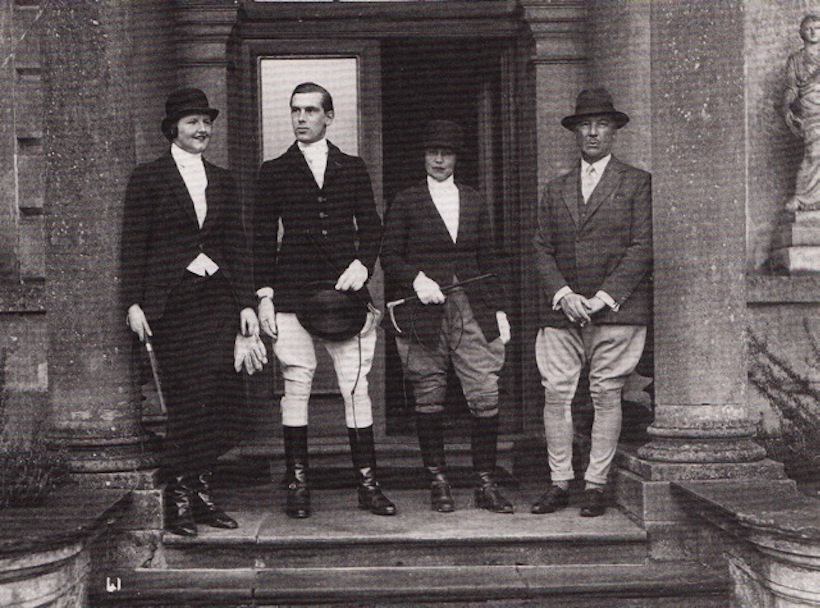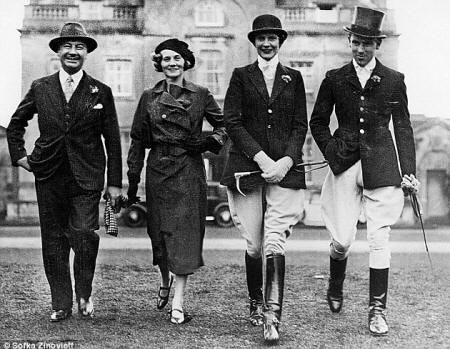

Partner Robert Heber-Percy
Queer Places:
Eton College, Windsor SL4 6DW, Regno Unito
3 Halkin St, Belgravia, London SW1X 7DJ, Regno Unito
Faringdon Folly & House, The Courtyard, 9 Market Place, Market Pl, Faringdon SN7 7HL, Regno Unito
 Gerald Hugh Tyrwhitt-Wilson, 14th Baron Berners[1]
(18 September 1883 – 19 April 1950), also known as Gerald Tyrwhitt, was a
British composer, novelist, painter and aesthete. He is usually referred to as
Lord Berners.
Gerald Hugh Tyrwhitt-Wilson, 14th Baron Berners[1]
(18 September 1883 – 19 April 1950), also known as Gerald Tyrwhitt, was a
British composer, novelist, painter and aesthete. He is usually referred to as
Lord Berners.
Berners was born in Apley Hall, Shropshire, in 1883, son of The Honorable Hugh Tyrwhitt (1856-1907) and his wife Julia (1861-1931), daughter of William Orme Foster, Apley's owner.[2] His father, a Royal Navy officer,[3] was rarely home. He was brought up by a grandmother who was extremely religious[4] and self-righteous, and a mother who had little intellect and many prejudices. His mother, a wealthy ironmaster’s daughter with a strong interest in fox hunting,[5] ignored his musical interests and instead focused on developing his masculinity, a trait Berners found to be inherently unnatural. Berners later wrote, "My father was worldly, cynical, intolerant of any kind of inferiority, reserved and self-possessed. My mother was unworldly, naïve, impulsive and undecided, and in my father's presence she was always at her worst".[6]
The eccentricities Berners displayed started early in life. Once, upon hearing that you could teach a dog to swim by throwing him into water, the young Gerald promptly decided that by throwing his mother's dog out the window, he could teach it to fly. The dog was unharmed, though the act earned Berners a beating.

At Faringdon, with (from left) Lord Berners, Doris Castlerosse, Daphne Weymouth and Robert Heber-Percy

Faringdon, February 1937. Gertrude Stein is sitting on the right, opposite Lord Berners. Their partners are sitting on the steps: Robert Hebert-Percy and Alice B. Toklas.
Including Sir Robert and Lady Diane Abdy.
After devising several inappropriate booby traps, Berners was sent off to the boarding school Cheam School at the age of nine. It was here that he would first explore his homosexuality; for a short time, he was romantically involved with an older pupil. The relationship was abruptly ended after Berners vomited on the other boy.
After he left prep school, Gerald continued his education at Eton College. Later, in his autobiographies, Berners would reflect on his experiences at Eton, claiming that he had learned nothing while there, and that the school was more concerned with shaping the young men's characters than supplying them with an education.
When Gerald Tyrwhitt-Wilson (Lord Berners) told his mother, in 1904, that Richard Strauss’ Salomé was based on the play by Oscar Wilde, she responded, ‘Oh, hush, dear.’
In 1918, Berners became the 14th Baron Berners after inheriting the title, property, and money, from an uncle.[7][8] His inheritance included Faringdon House, which he initially gave to his mother and her second husband; on their deaths in 1931 he moved into the house himself.[9] In 1932, Berners fell in love with Robert Heber-Percy, 28 years his junior, who became his companion and moved into Faringdon House.[10] Unexpectedly, Heber-Percy married a 21-year-old woman, Jennifer Fry, who had a baby nine months later. For a short time, she and the baby lived at Faringdon House with Heber-Percy and Berners.[11]
As well as being a talented musician, Berners was a skilled artist and writer. He appears in many books and biographies of the period, notably portrayed as Lord Merlin in Nancy Mitford's The Pursuit of Love.[12] In January 2016, he was played by actor Christopher Godwin in episode 3 of the BBC Radio 4 drama What England Owes.[13] He was a friend of the Mitford family and close to Diana Guinness.
Berners was notorious for his eccentricity,[14] dyeing pigeons at his house in Faringdon in vibrant colours and at one point entertaining Penelope Betjeman's horse Moti to tea.[7] There were paper flowers in the garden and the interior of the house was adorned with joke books and joke notices, such as "Mangling Done Here". As visitor Patrick Leigh Fermor recalled:
"No dogs admitted" at the top of the stairs and "Prepare to meet thy God" painted inside a wardrobe. When people complimented him on his delicious peaches he would say "Yes, they are ham-fed". And he used to put Woolworth pearl necklaces round his dogs' necks [Berners had a dalmatian, Heber Percy the retriever, Pansy Lamb] and when a guest, rather perturbed, ran up saying "Fido has lost his necklace", G said, "Oh dear, I'll have to get another out of the safe."[14]
Other visitors to Faringdon included Igor Stravinsky, Salvador Dalí, H.G. Wells, and Tom Driberg.[15]
His Rolls-Royce automobile contained a small clavichord keyboard which could be stored beneath the front seat. Near his house he had a 100-foot viewing tower, Faringdon Folly, constructed as a birthday present in 1935 for Heber-Percy,[15] a notice at the entrance reading: "Members of the Public committing suicide from this tower do so at their own risk".[16] Berners also drove around his estate wearing a pig's-head mask to frighten the locals.[4][12]
He was also subject throughout his life to periods of depression which became more pronounced during the Second World War, and following the production of his last ballet production Les Sirènes he lost his eyesight.[17]
He died in 1950 aged 66 at Faringdon House, bequeathing his estate to his companion Robert ('Mad Boy') Heber-Percy,[7] who lived at Faringdon until his own death in 1987.[18] His ashes are buried in the lawn near the house.[19]
Berners wrote his own epitaph, which appears on his gravestone:
My published books: